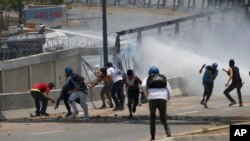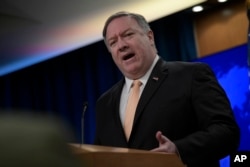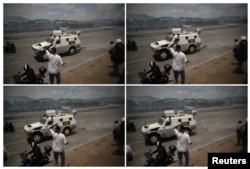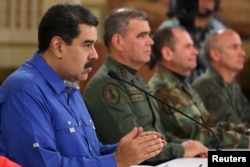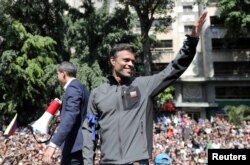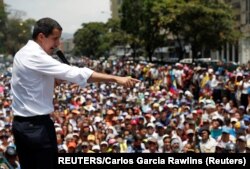U.S. Secretary of State Mike Pompeo says the United States is prepared to intervene militarily to stem the ongoing unrest in Venezuela.
"Military action is possible," the top U.S. diplomat told the Fox Business Network. "If that is what is required, that is what the United States will do."
Pompeo, however, reiterated that the U.S. would prefer a peaceful transition of power in Caracas from socialist President Nicolas Maduro to the self-declared interim president Juan Guaido, president of the National Assembly, and recognized by the United States and about 50 other countries as the legitimate leader of the South American country.
Pompeo's signal that the U.S. could send troops to Venezuela drew a quick rebuke from Russia, a strong Maduro supporter.
Moscow said Foreign Minister Sergei Lavrov warned Pompeo in a phone call that further "aggressive steps" by the U.S. in Venezuela would be "fraught with the most serious consequences." The Russian diplomat denounced what he said was the United States' "interference" in Venezuela's internal affairs, calling it "a gross violation of international law."
The U.S. State Department said Pompeo urged Moscow to end its involvement in Venezuela, telling Lavrov that Russian and Cuban actions there would destabilize it and could upend U.S.-Russian relations on a broader scale.
Pompeo told interviewers that Maduro, in the face of street protests against his government, was prepared to leave Venezuela for Cuba on Tuesday, but that Russia convinced him to stay to fight Guaido's call for the Venezuelan military to join him in a push to overthrow Maduro.
Maduro and the Russian Foreign Ministry denied the Maduro departure allegation, with Moscow saying the U.S.'s claim was part of its "information war" designed to demoralize the Venezuelan army and foment a coup.
Guaido emerged at a May Day street protest vowing to demonstrators, "We're going to remain in the streets until we achieve freedom for the Venezuelan people. The regime will try to increase the repression. It will try to persecute me."
Rock- and Molotov-cocktail-throwing protesters and government security troops clashed Tuesday, with authorities firing live ammunition, water cannon and rubber bullets at the demonstrators, killing one and injuring dozens.
Television footage showed one Venezuela National Guard vehicle running over demonstrators who were throwing rocks at the military. The government said one of its soldiers was hit by a bullet.
Tear gas smoke wafted across streets in Caracas on Wednesday, with armor-clad police carrying shields to stand defiantly against rock-throwing protesters. But there appeared to be fewer clashes with authorities than on Tuesday.
Guaido said staggered industrial action would begin on Thursday, leading to a general strike.
Maduro claimed Guaido's attempted coup had been defeated.
Maduro congratulated the armed forces for having "defeated this small group that intended to spread violence through putschist skirmishes."
"This will not go unpunished," Maduro said in a television and radio broadcast.
He said demonstrators will be prosecuted "for the serious crimes that have been committed against the constitution, the rule of law and the right to peace."
Thousands of demonstrators have joined the street protests after the U.S.-backed Guaido called for the military to reject Maduro's rule and switch sides in a campaign he called "Operation Freedom."
Guaido appeared Tuesday alongside opposition politician Leopoldo Lopez, who had been put under house arrest by Maduro, but said he had been "freed" by soldiers supporting Guaido.
Lopez posted a picture of men in uniform on Twitter with the message, "Venezuela: the definitive phase to end the usurpation, Operation Liberty, has begun." Later, Lopez and his family went to the Chilean Embassy to seek refuge, then moved to the Spanish Embassy.
Tuesday ended without any sign of defections within the military's top ranks from Maduro to Guaido. But Guaido appeared undaunted in a video message posted on social media late Tuesday, vowing to keep up the pressure on the embattled Maduro.
Despite widespread food and medical shortages and a failing economy in Venezuela, the socialist Maduro government has clung to power with the support of most of the military. Venezuela's two biggest creditors, Russia and China, also have continued to support Maduro.
Meanwhile, the United States has imposed sanctions on Caracas in an effort to curb its international oil sales.
Guaido invoked the constitution to declare himself interim president in January after calling Maduro's leadership illegitimate because of election fraud.
In a related development, the U.S. Federal Aviation Administration issued an order late Tuesday banning all U.S. airlines from flying in Venezuela's airspace below 7,000 meters until further notice, citing "increasing political instability and tensions."
The FAA also ordered all air operators in Venezuela, including private jets, to leave the country within 48 hours.




